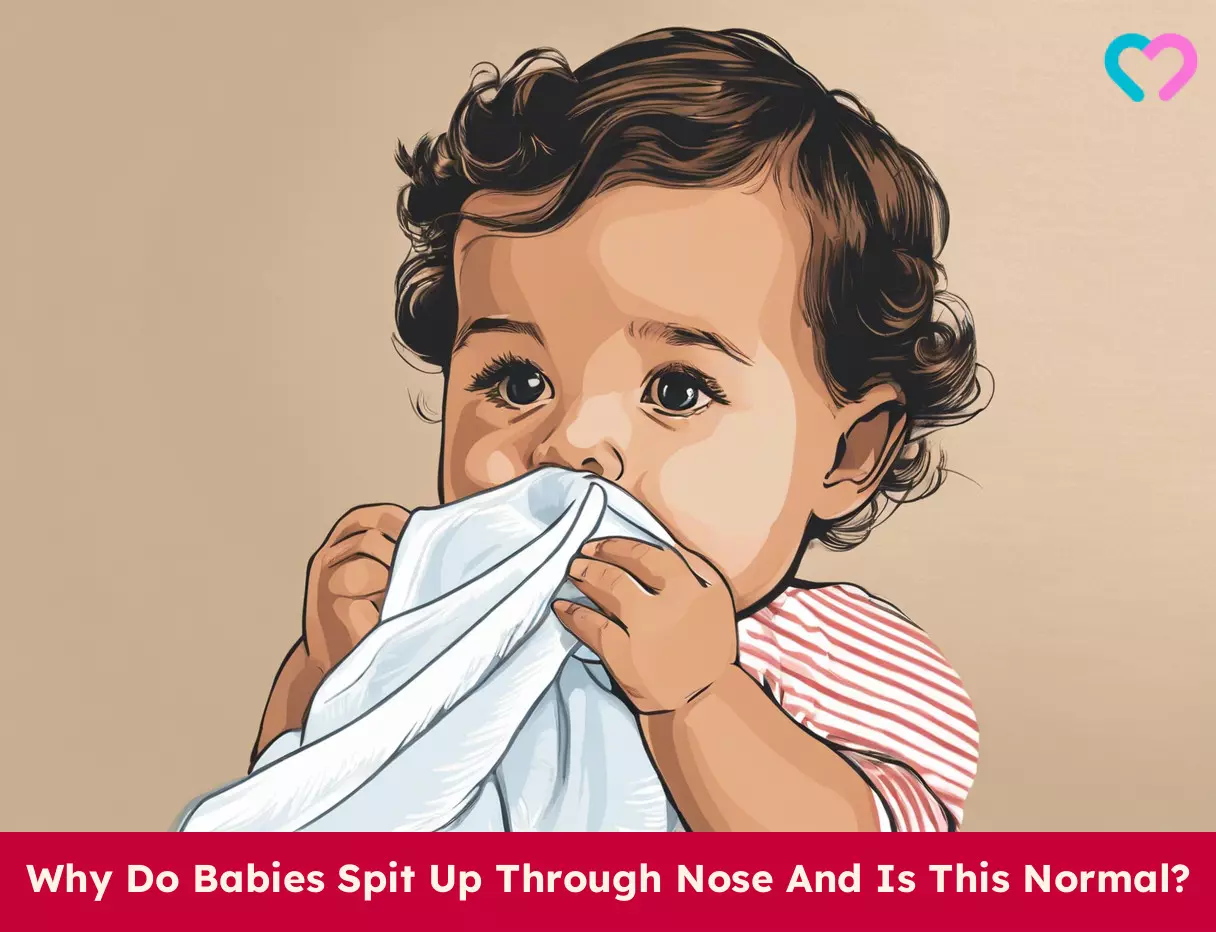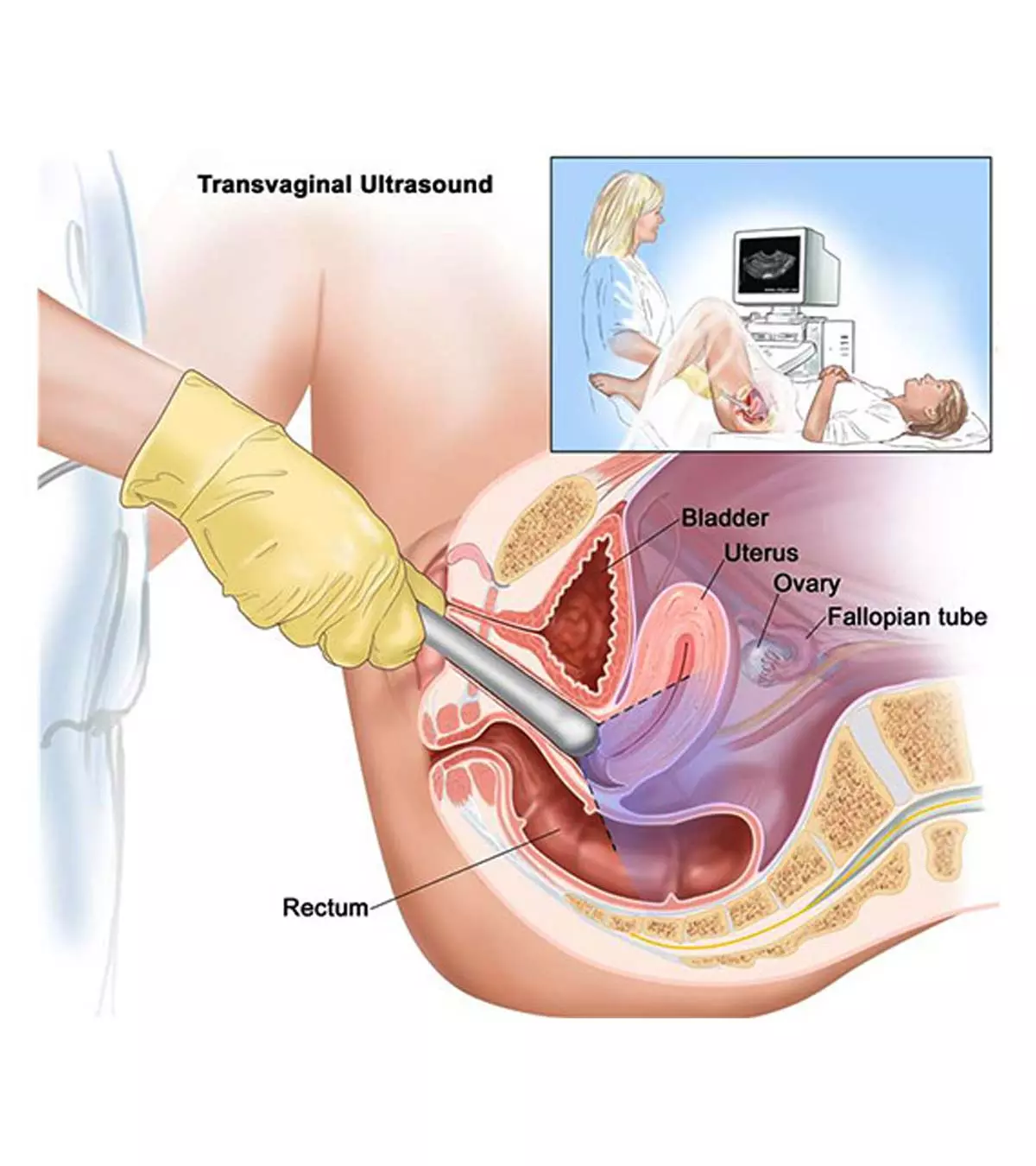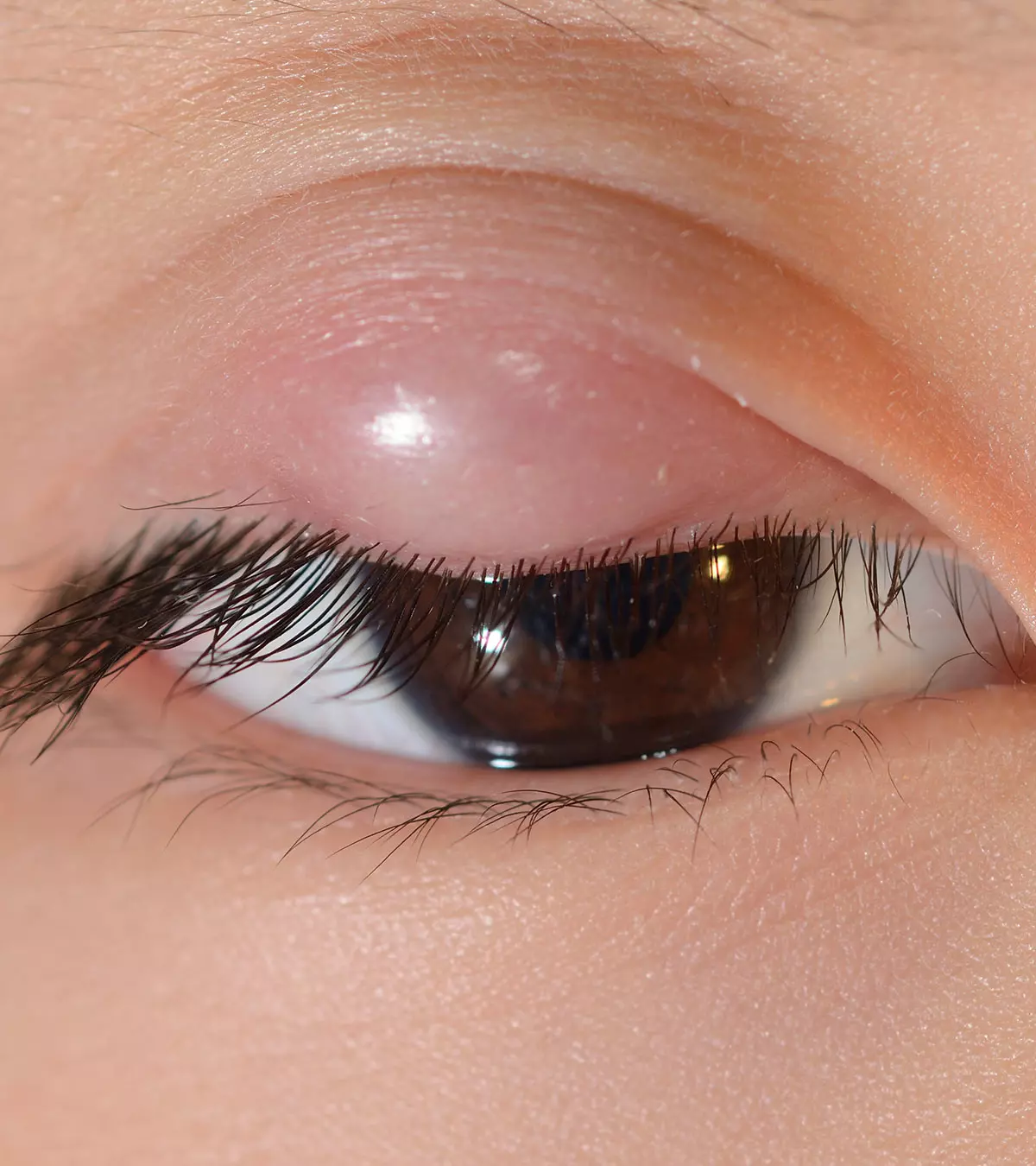
Image: Shutterstock
Spit-up in babies is common due to swallowing extra air during breastfeeding or formula feeding. This is also called regurgitationiThe act of spitting up food or liquids from the stomach , and nearly 67% of babies have this gastrointestinal issue once a day (1). In some babies, possetting may be more frequent compared with others. Sometimes the spit-up may come out of the nose since it is connected to the back of our throat (2). Following proper feeding techniques and changing feeding positions may help some babies. Holding in an upright position, especially after feeding, may reduce this problem in some infants. You may seek medical care if your baby has recurrent nasal regurgitation since this may interfere with normal growth and development. Keep reading this post to know the causes and ways to prevent spit-up in newborns.

Key Pointers
- Spitting up through the mouth and nose is a common gastrointestinal reflex that occurs in small amounts in babies until almost a year.
- It usually happens when babies consume excessive air or milk during breastfeeding, are sensitive to certain foods, or when they cough, choke, or sneeze during or after feeding.
- Frequent spit up can lead to nasal and esophageal irritation and aspiration-induced pneumonia, as well as impact babies’ nutrient intake.
- To reduce spit-ups, ensure a steady flow of milk, burp the baby, provide short and frequent feedings, prevent distractions during feeding, use proper feeding positions, and avoid bouncing, laying down, or playing immediately after feeding.
- Consult a doctor if spit-ups persist, intensify, or interfere with the baby’s growth and development.
What Is The Difference Between Spit-Up And Vomiting?
The American Academy of Pediatrics describes vomiting as the forceful throwing up of the stomach content through the mouth. And to sharp contrast, spitting up is described as the easy flow of the stomach contents with a burp. It is often referred to as reflux. A study showed that half to two-thirds of all babies experience reflux at least once a day until they reach six months of age (3):
To be precise, spitting up has the following features (2):
- It does not involve forceful muscle contraction.
- It brings up only small quantities of milk.
- It does not make your baby uncomfortable.
Why Do Babies Spit Up Through The Nose?
Spit-up in babies could be due to different reasons. Some of these could be harmless, while others might indicate an underlying health condition.
- Partially developed valve: The esophagus is connected to the tummy through a valve that is still underdeveloped in babies, and sometimes it cannot hold all the stomach’s contents. If you feed your baby with excess milk or formula or if they swallow too fast, it can aggravate the spitting up (4).
- Hiccups, coughs, or sneezes: The swallowing process may become a little complex if your baby is hiccupping, coughing, or sneezing. These conditions increase the pressure on the esophagus, which may exacerbate spitting up through the nose (5).

- Ingesting air: Your baby may sometimes ingest some air along with breast milk or formula. Later, when the air tries to expel out, it comes out with milk as it gets trapped in milk. It will thus come out through the mouth or nose (6).
- Distractions: Sometimes, babies might get distracted while feeding (especially if there is someone around or there’s a lot of noise), and they will not pay attention to what they are doing. They may forget to swallow when they should and may choke, and this causes the milk to come out through the nose.
A mom of an infant shares her experience with her baby spitting up, “I have a five-week-old baby today, and I remember that even though I knew in my mind milk coming out of a newborn’s nose was normal. It still disturbed me, and I know it did, my husband. Even though it seems scary, do not fear. The first time it happens to you, I’m sure it will scare you a little, but just remember it’s ok and normal! (ⅰ).”

- Food sensitivities: Possible food sensitivities or an allergy, such as cow’s milk sensitivity could cause spitting up. Cow’s milk and its products in baby’s feed could lead to this (2). Research indicates that the incidence of cow’s milk protein allergy (CMPA) is approximately 5–7% in formula-fed babies, compared to 0.5–1% in breastfed babies (7).
 Quick tip
Quick tipHow Does Spitting Up Through Nose Impact A Baby?
When babies spit up, it may irritate their nose, but may not be a cause of concern. However, if they often spit up large amounts, there is a possibility that they might not get enough nutrients for growth. This may impact the baby’s growth, weight gain, and developmental milestones. If this is the case, you need to consult a pediatrician to evaluate the condition and take appropriate measures.
Also, frequent spit-up could irritate the nasal and esophageal lining, which could indicate GERDiAn acid reflux accompanied by heartburn and vomiting that causes the stomach contents to flow back to the mouth (8). A study found that 24.4% of infants aged 0 to 23 months showed symptoms of GER, while 12.6% had GERD (9).
Small amounts of this regurgitated milk might spill over into the trachea (air pipe) and go into the lung. This is a serious complication called aspiration and might lead to pneumonia.
How Can You Reduce Spitting Up?
Parents worry when they see their babies spit up through their noses. Although the condition may feel alarming, it is usually a harmless occurrence linked to the baby’s anatomy. Here are some ways to help reduce the bouts of spit-ups in a baby:
1. Check the bottle nipple

If you are using a feeding bottle, you should double-check the nipple hole to ensure that it lets out a few drops at a time. Doing this ensures that your baby will not get too much milk at a time. Also, this will ensure that the baby is not gulping too much air while swallowing.
2. Limit the feed
If your baby is being breastfed, try to limit the length of each feed. Short and frequent feedings could reduce the bouts of spitting up.
3. Do not overfeed

Overfeeding may cause increased spitting up as the digestive system and stomach muscles are all developing. You may take advice from your pediatrician about how much and how frequently you should feed your little one to minimize the symptoms.
If your baby’s stomach is full, they are bound to spit up, especially when you bounce them or move them too much after feeding (2). So, don’t allow your baby to play immediately after feeding.
Karen Gentile, pediatric nurse practitioner from Denver, suggests, “Parents should be aware that breastfed babies regulate their intake naturally, whereas formula-fed babies require us to estimate how much formula they need; occasionally, this can cause over-feeding if we aren’t mindful. Parents should always directly feed their babies and avoid bottle propping.”
4. Feed on time
You should breastfeed, or formula-feed your little one on time so that they don’t get super hungry. This might lead to feeding in a hurry that could then lead to choking and spitting up.
5. Avoid distractions
When feeding your baby, make sure that you are in a calm place. Do not feed in a noisy area, as loud noises or sudden movements during feeding may distract the baby, leading to increased spit-up.
6. Upright position
Hold your little one in an upright position during and after feeding. It will allow the feed to pass smoothly through the digestive system and will not cause any disturbances like spitting up.
7. Burp your baby

Take time to burp your little one, as it will restrict air from building up in the tummy. The American Academy of Pediatrics (AAP) states, “To minimize the chances of this happening, burp not only after, but also during meals (2).” This way, the air comes out and will not cause any irritation for your baby.
8. Keep pressure off the tummy
Do not dress your baby in a tight diaper or clothes soon after feeding, as it may stress the tummy and make them uncomfortable.
9. Put baby to sleep on the back
The risk of choking and spitting up is greatly reduced when babies sleep on their backs. Doing this also reduces the risk of SIDS (sudden infant death syndrome).
 Quick fact
Quick factWhen To See A Doctor?
Most infants spit up because of improper feeding positions. But sometimes it may also be due to certain medical conditions. You should seek your pediatrician’s help if your baby (10) (11):
- Experiences discomfort due to frequent spit up
- Has congestion, wheezing, or difficulty breathing
- Has difficulty sucking or swallowing, which may be a problem of the soft palate
- Spits up large amounts after each feed
- Experiences severe spit-ups that turns into vomiting (forceful or projectile), especially if the baby’s age is less than 12 weeks
- Spits up blood or green color material
- Persistently spits up through the nose, which can also be a defect of the palate in the mouth and is not visible through physical examination.
- Experiences choking or coughing with spit ups
- Continues to spit up even after the early childhood stage
- Looks very ill
If a baby spits up blood or green color material, promptly consult a pediatrician. A doctor’s guidance is also necessary if you notice that the spitting up is interfering with the growth and development of the baby.
 Quick fact
Quick factWhen Does A Baby Stop Spitting Up?
Most babies will stop spitting up by six months or after they learn to sit. But, in some cases, they may continue spitting up until one year.
Even after your baby stops spitting up, some liquid may still come out of the nose because babies do not have control over the swallowing process. As the digestive system develops and muscles grow stronger, the baby might stop regurgitating the feed and hold it within the tummy.
Frequently Asked Questions
1. What should I do when milk comes out from a baby’s nose and/or mouth while sleeping?
If a baby is gagging on milk or throwing milk out of their nose and mouth while sleeping, try to keep them upright or turn them onto their side or stomach to help prevent choking. If the baby continues to choke or struggle to breathe, seek medical attention.
2. How does spitting up milk while sleeping affect a baby?
While it is common for babies to spit up milk from their nose or mouth and are usually harmful if it frequently occurs when your baby is asleep, spitting up milk may disturb their sleep. Otherwise, babies spitting up milk while sleeping on their backs do not pose any threat (12).
3. Is it okay to feed a baby while they are spitting up through their nose?
No, feeding a baby while spitting up through their nose is not advised. So, before continuing to feed, ensure to place the baby upright and clear the nose to prevent choking, coughing, or other discomforts.
Although spitting up is considered a natural reflex in babies, it is advised that you monitor their patterns from time to time. Ensure that your baby is not distracted while you are feeding them and are not ingesting extra air, as this might increase the chances of spitting up through their noses. Not overfeeding your baby, burping them after every feed, and slowing the pace of feeding can help in reducing the occurrences of spit-ups. Do not get concerned when your baby spits up, but consult a doctor if this occurs regularly and is accompanied by difficulty in their breathing.
Infographic: How Can You Reduce Spitting Up In Babies
Spitting up is a common occurrence in babies. While it is usually harmless, it can cause discomfort to the baby. So explore simple ways to reduce spitting up in your little one. These techniques can help prevent spitting up and make the experience more manageable for the baby and parent.
Some thing wrong with infographic shortcode. please verify shortcode syntax
Illustration: Why Do Babies Spit Up Through Nose And Is This Normal?

Image: Stable Diffusion/MomJunction Design Team
Babies spitting up milk through their noses is quite common. In this video, learn how to prevent milk from coming out of your baby’s nose when they’re full. Tips and tricks to keep your baby comfortable and happy.
Personal Experience: Source
MomJunction articles include first-hand experiences to provide you with better insights through real-life narratives. Here are the sources of personal accounts referenced in this article.
ⅰ. Newborns: Help! Milk is coming out my baby’s nose!.https://encmoms.blogspot.com/2012/10/newborns-help-milk-is-coming-out-my.html
References
1. Bert J. M. van de Heijning et al.; GI Symptoms in Infants Are a Potential Target for Fermented Infant Milk Formulae: A Review; National Center For Biotechnology Information (2014)
2. Why Babies Spit Up; Healthy Children; American Academy of Pediatrics
3. Birth: Learn More – Reflux in babies; National Library of Medicine
4. Spitting up – self-care; Mount Sinai
5. Infant Regurgitation; International Foundation for Gastrointestinal Disorders
6. Feeding your baby; Kaiser Permanente
7. Sambrook, Jan; Incidence of Cow’s Milk Protein Allergy; National Center For Biotechnology Information (2016)
8. Newborn baby spit-up: What parents need to know; Children’s Wisconsin
9. Curien-Chotard, Marlène, and Prévost Jantchou;Natural History of Gastroesophageal Reflux in Infancy: New Data from a Prospective Cohort; National Center For Biotechnology Information (2025)
10. Spit-Up Concerns; National Research Hospital
11. Spitting Up – Reflux; Seattle Children’s Hospital
12. Myths and Facts About SIDS and Safe Infant Sleep; Safe To Sleep; NIH
Community Experiences
Join the conversation and become a part of our nurturing community! Share your stories, experiences, and insights to connect with fellow parents.
Read full bio of Dr. Elna Gibson
- Karen Gentile is a pediatric nurse practitioner with 13 years experience in ER and ICU. Holding licenses to practice in Colorado, Illinois, and Texas, Karen currently manages her private pediatric telemedicine practice that focuses on non-emergent illnesses, weight management, newborn care, and parental guidance. She did her BSN in Northern Illinois University and MSN in Texas Woman’s University.
 Karen Gentile is a pediatric nurse practitioner with 13 years experience in ER and ICU. Holding licenses to practice in Colorado, Illinois, and Texas, Karen currently manages her private pediatric telemedicine practice that focuses on non-emergent illnesses, weight management, newborn care, and parental guidance. She did her BSN in Northern Illinois University and MSN in Texas Woman’s University.
Karen Gentile is a pediatric nurse practitioner with 13 years experience in ER and ICU. Holding licenses to practice in Colorado, Illinois, and Texas, Karen currently manages her private pediatric telemedicine practice that focuses on non-emergent illnesses, weight management, newborn care, and parental guidance. She did her BSN in Northern Illinois University and MSN in Texas Woman’s University.
Read full bio of Swati Patwal
Read full bio of Rohit Garoo
Read full bio of Ghazia Shah

















